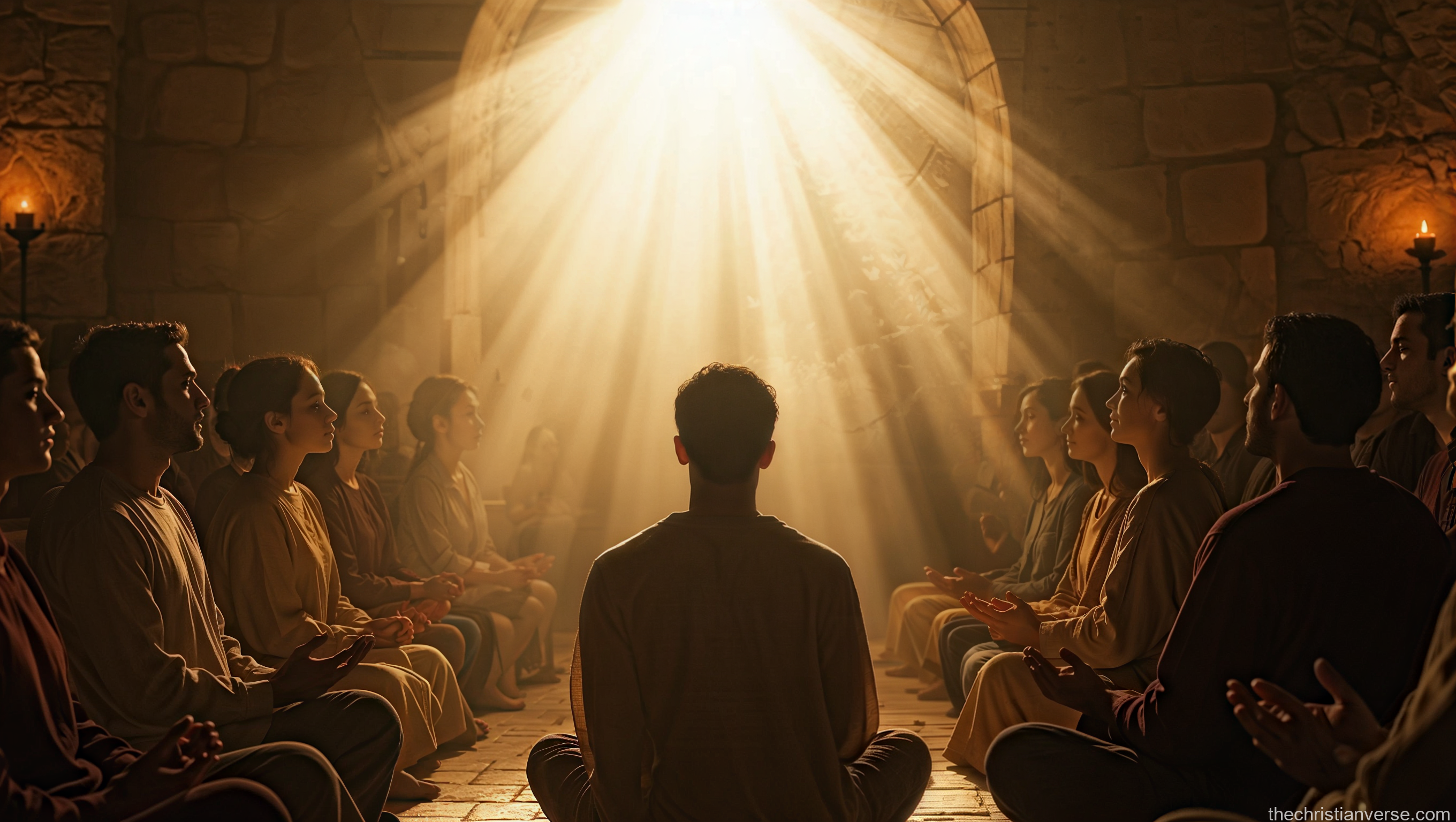Acts 2:1 - Now when the day of Pentecost had come, they were all with one accord in one place.

Select Bible Verse
Filter Categories
A
B
C
D
E
F
G
H
I
J
K
L
M
N
O
P
R
S
T
U
V
W
What does "Acts 2:1" mean?
This verse, Acts 2:1, sets the scene for the momentous events that unfold on the Day of Pentecost. Let's break down what it means:
"Now when the day of Pentecost had come...":
Pentecost was a significant Jewish festival. It was celebrated 50 days after Passover (hence its name, from the Greek word for "fiftieth"). Originally, it was a harvest festival, but it also commemorated the giving of the Law to Moses on Mount Sinai. For Jewish pilgrims from all over the world, this was a major pilgrimage holiday.
The timing is crucial. The apostles and followers of Jesus were in Jerusalem specifically because of this festival, and Jerusalem was swelling with Jewish pilgrims from all over the world.
"...they were all with one accord...":
"All" likely refers to the apostles and other followers of Jesus, around 120 people, as mentioned in Acts 1:15.
"With one accord" (Greek: homothumadon) is a vital phrase. It describes a state of complete unity, harmony, and purpose. They were united in their faith, prayer, and expectation of what God would do. It implies a shared heart and mind, a collective intention. This emphasizes a sense of shared purpose and mutual encouragement as they awaited the fulfillment of Jesus' promise.
"...in one place.":
"One place" the upper room is mentioned in Acts 1:13.
In summary, the verse describes:
The Timing: It was the Day of Pentecost, a significant Jewish festival.
The Unity: The believers were together, united in spirit and purpose.
The Location: They were gathered in one specific place in Jerusalem.
Significance:
This verse is more than just setting the stage. It highlights the importance of unity and being in the right place at the right time when God is about to act. The unity of the believers was crucial for the outpouring of the Holy Spirit that followed. Their shared purpose created an atmosphere conducive to receiving God's power and beginning the church's mission.
It also points to a continuity with God's dealings with Israel at Mount Sinai. Just as God gave the Law to a united Israel, He now gave the Holy Spirit to a united group of believers, marking a new covenant and a new beginning. The Jewish harvest festival also becomes a harvest of souls that is fulfilled by the preaching of the Gospel.
Acts 2:1 - Now when the day of Pentecost had come, they were all with one accord in one place.

What does "Acts 2:1" mean?
This verse, Acts 2:1, sets the scene for the momentous events that unfold on the Day of Pentecost. Let's break down what it means:
"Now when the day of Pentecost had come...":
Pentecost was a significant Jewish festival. It was celebrated 50 days after Passover (hence its name, from the Greek word for "fiftieth"). Originally, it was a harvest festival, but it also commemorated the giving of the Law to Moses on Mount Sinai. For Jewish pilgrims from all over the world, this was a major pilgrimage holiday.
The timing is crucial. The apostles and followers of Jesus were in Jerusalem specifically because of this festival, and Jerusalem was swelling with Jewish pilgrims from all over the world.
"...they were all with one accord...":
"All" likely refers to the apostles and other followers of Jesus, around 120 people, as mentioned in Acts 1:15.
"With one accord" (Greek: homothumadon) is a vital phrase. It describes a state of complete unity, harmony, and purpose. They were united in their faith, prayer, and expectation of what God would do. It implies a shared heart and mind, a collective intention. This emphasizes a sense of shared purpose and mutual encouragement as they awaited the fulfillment of Jesus' promise.
"...in one place.":
"One place" the upper room is mentioned in Acts 1:13.
In summary, the verse describes:
The Timing: It was the Day of Pentecost, a significant Jewish festival.
The Unity: The believers were together, united in spirit and purpose.
The Location: They were gathered in one specific place in Jerusalem.
Significance:
This verse is more than just setting the stage. It highlights the importance of unity and being in the right place at the right time when God is about to act. The unity of the believers was crucial for the outpouring of the Holy Spirit that followed. Their shared purpose created an atmosphere conducive to receiving God's power and beginning the church's mission.
It also points to a continuity with God's dealings with Israel at Mount Sinai. Just as God gave the Law to a united Israel, He now gave the Holy Spirit to a united group of believers, marking a new covenant and a new beginning. The Jewish harvest festival also becomes a harvest of souls that is fulfilled by the preaching of the Gospel.